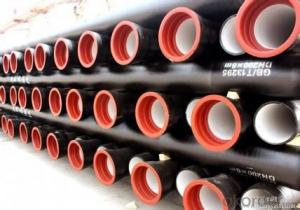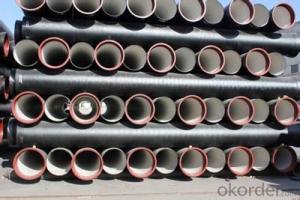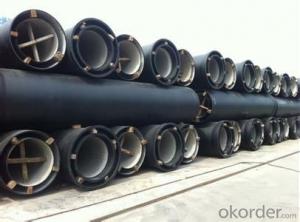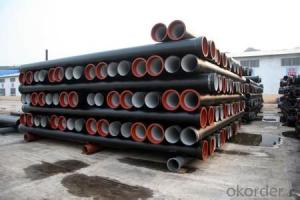DUCTILE IRON PIPE K8 DN200
- Loading Port:
- China Main Port
- Payment Terms:
- TT OR LC
- Min Order Qty:
- -
- Supply Capability:
- -
OKorder Service Pledge
OKorder Financial Service
You Might Also Like
Ductile Iron Cast Pipe is without any defects compare with tradition casting tech, which has many advantages particularly as follow:
(1) High density. In the "vertical upward casting" process, the melt iron of centre liquid column in center crystallizer is continuously feeding for volume shrinkage caused by condensation tube at outer circumference , which lead to be free of shrinkage porosity.
(2) High purity. When melt iron pouring, the mixed impurities such as gas, dross, sand grain which are lighter than melt iron could be eliminated at furnace mouth, its impossible to enter into the crystallizer through the channel, so the melt iron into the crystallizer is very pure.
(3) Strength with toughness. The cooling speed provided by continuous crystallizer is 30 times than sand casting and 5 times than centrifugal casting, and doesn't produce white iron, the eutectic cell volume of continuous cast iron is one eighth to one tenth compare with traditional cast iron. The density of graphite nodule in ductile iron can reach 300-700 pcs/mm2. Therefore, all reason above improve the strength and toughness of continuous cast iron.
(4) Free machining. The high speed cooling make the hardening phase (such as boride, steadite) not appear like reticular, massive or thick, but diffuse like fish bone and pane in shape, moreover, there are tiny graphite flakes inlaid hardening phase. It's free machining in BrinellHardness the range of 250-300HB. However, the Brinell Hardness of 250 is top limit to common metal materials.
(5) Uniform composition of tube wall. The convection mixing of liquid column caused by marching type drawing in crystallizer make the composition of tube wall well-distributed, and concentration gradient very little.
(6) High productivity. To the wall thickness of tube under 10mm, the speed of continuous casting is 1 meter/min, to the wall thickness of tube under 20mm, the speed of continuous casting is 0.5 meter/min, which is high efficiency that centrifugal or other casting tech couldn't reach.
- Q:Can ductile iron pipe be used for oil and gas transmission pipelines?
- Yes, ductile iron pipe can be used for oil and gas transmission pipelines. Ductile iron pipe has many advantageous properties that make it suitable for such applications. It has a high tensile strength, which allows it to withstand the high pressures and stresses involved in oil and gas transmission. Additionally, ductile iron pipe has excellent corrosion resistance, making it highly resistant to the corrosive nature of oil and gas. This resistance is further enhanced by the use of protective coatings on the pipe's exterior. Ductile iron pipe is also known for its durability and longevity, ensuring the reliability and longevity of oil and gas transmission pipelines. Overall, the properties of ductile iron pipe make it a reliable and cost-effective option for use in oil and gas transmission pipelines.
- Q:Can ductile iron pipes be used in nuclear power plants?
- Ductile iron pipes are suitable for use in nuclear power plants due to their improved flexibility and strength compared to traditional cast iron pipes. They are known for their durability, resistance to corrosion, and ability to withstand high pressure and temperature conditions. These pipes are a reliable and robust choice for transporting water, coolant, and other fluids in nuclear power plants. However, it is crucial to consider the specific requirements and regulations of each power plant before selecting the pipe material. It is necessary to ensure proper testing, certification, and compliance with nuclear industry standards to guarantee the safe and efficient operation of the power plant.
- Q:What is the expected deflection range for ductile iron pipes?
- The expected deflection range for ductile iron pipes can vary depending on several factors such as pipe diameter, wall thickness, soil conditions, and installation methods. Generally, ductile iron pipes have a higher deflection capacity compared to other materials like PVC or concrete pipes. For smaller diameter ductile iron pipes (up to 12 inches), the expected deflection range is typically around 2-3% of the pipe diameter. This means that a 12-inch ductile iron pipe could deflect up to approximately 0.24-0.36 inches. For larger diameter ductile iron pipes (greater than 12 inches), the expected deflection range can be slightly higher, ranging from 2-5% of the pipe diameter. This means that a 24-inch ductile iron pipe could deflect up to approximately 0.48-1.2 inches. It is important to note that these values are general estimates and should be verified with the manufacturer's specifications or engineering design guidelines for a specific project. Additionally, proper installation techniques and backfilling practices should be followed to ensure the pipe's structural integrity and prevent excessive deflection.
- Q:There are several forms of flexible interfaces for Spigot Cast Iron Pipes
- At present, the flexible interfaces include slip type rubber ring interface, R rubber ring interface, flexible mechanical interface, A type and flexible mechanical interface, K type.1. slip in rubber ring interfaceRubber ring and pipe are supplied by supply factory. A rubber ring is installed before the socket in the working surface and no tower water supply equipment Jack working surface cleaned, the rubber ring embedded concave socket tip in the rubber ring, and the exposed surface and the socket of the working face, coated with lubricant has no influence on the quality of the rubber ring. The water supply equipment socket end chamfering and rubber ring even after contact with special tool socket socket will push, push people to mark depth should be set in advance, before the festival, before the two push interface depth and review has been.
- Q:Do ductile iron pipes require concrete encasement for support?
- No, ductile iron pipes do not typically require concrete encasement for support. Ductile iron pipes have sufficient strength and flexibility to support their own weight and withstand typical loads without the need for additional concrete encasement.
- Q:Are ductile iron pipes resistant to freeze-thaw cycles?
- Yes, ductile iron pipes are resistant to freeze-thaw cycles. Ductile iron is a type of cast iron that has been treated with magnesium, which improves its strength, durability, and resistance to cracking. This enhanced material properties make ductile iron pipes highly resistant to the expansion and contraction that occurs during freeze-thaw cycles. Unlike other materials such as PVC or concrete, which may crack or break under the pressure caused by freezing water, ductile iron pipes have the ability to withstand these cycles without sustaining any significant damage. Additionally, ductile iron pipes have a smooth interior surface that prevents the formation of ice or frost buildup, further enhancing their resistance to freeze-thaw cycles. Overall, ductile iron pipes are an excellent choice for water distribution systems in regions with cold climates, as they offer superior resistance to the effects of freezing and thawing.
- Q:Are ductile iron pipes suitable for bridge crossings or crossings under roadways?
- Yes, ductile iron pipes are suitable for bridge crossings or crossings under roadways. They possess high strength and durability, making them capable of withstanding heavy loads and traffic conditions. Additionally, their flexibility and resistance to external pressures make them an ideal choice for such applications, ensuring long-lasting and reliable performance.
- Q:Can ductile iron pipes be used for underground river crossings?
- Underground river crossings can indeed utilize ductile iron pipes. Renowned for their robustness and longevity, ductile iron pipes are highly versatile, making them ideal for a range of applications, including underground river crossings. These pipes possess exceptional tensile strength, enabling them to withstand the external forces and pressures imposed by the surrounding soil and water. Moreover, their outstanding resistance to corrosion is paramount when dealing with subterranean water sources like rivers. Additionally, ductile iron pipes can endure ground movements, settling, and any geological obstacles that may arise during the installation and operation of underground river crossings. Consequently, they represent a dependable choice, ensuring the secure and efficient conveyance of water across rivers while preserving the integrity of the subterranean infrastructure.
- Q:Can ductile iron pipe be used in corrosive environments?
- Ductile iron pipe is capable of being utilized in environments that are corrosive. Ductile iron is renowned for its ability to withstand corrosion and has been extensively employed in diverse applications where resistance to corrosion is necessary. The resistance of ductile iron to corrosion is attributed to the formation of a natural protective oxide layer on its surface, which acts as a barrier against corrosive substances. Furthermore, ductile iron pipes can be coated with different protective coatings such as polyethylene or epoxy to augment their resistance to corrosion. These coatings furnish an additional layer of protection, rendering ductile iron pipes appropriate for deployment in highly corrosive settings like wastewater treatment plants, industrial plants, and marine applications. Nevertheless, it is crucial to take into account the specific corrosive substances present in the environment and seek guidance from experts or adhere to industry standards to guarantee the proper implementation of coating and maintenance practices for long-term performance and durability.
- Q:Can ductile iron pipe be used for marine applications?
- Yes, ductile iron pipe can be used for marine applications. It is corrosion-resistant and has high strength, making it suitable for various marine environments and applications such as underwater pipelines, dock construction, and seawater intake systems.
1. Manufacturer Overview |
|
|---|---|
| Location | |
| Year Established | |
| Annual Output Value | |
| Main Markets | |
| Company Certifications | |
2. Manufacturer Certificates |
|
|---|---|
| a) Certification Name | |
| Range | |
| Reference | |
| Validity Period | |
3. Manufacturer Capability |
|
|---|---|
| a)Trade Capacity | |
| Nearest Port | |
| Export Percentage | |
| No.of Employees in Trade Department | |
| Language Spoken: | |
| b)Factory Information | |
| Factory Size: | |
| No. of Production Lines | |
| Contract Manufacturing | |
| Product Price Range | |
Send your message to us
DUCTILE IRON PIPE K8 DN200
- Loading Port:
- China Main Port
- Payment Terms:
- TT OR LC
- Min Order Qty:
- -
- Supply Capability:
- -
OKorder Service Pledge
OKorder Financial Service
Similar products
New products
Hot products
Related keywords




























